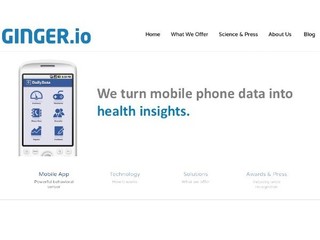Global AI in healthcare market expected to rise to $164B by 2030
The market size for 2023 was $10.31 billion
Read more... On-demand mental health company Ginger has had a pretty amazing last 12 months: not only did the company grow its revenue by approximately 3x over the past year, but demand for Ginger’s coaching services and clinical services has also increased up to 3x since the onset of the COVID-19 pandemic.
On-demand mental health company Ginger has had a pretty amazing last 12 months: not only did the company grow its revenue by approximately 3x over the past year, but demand for Ginger’s coaching services and clinical services has also increased up to 3x since the onset of the COVID-19 pandemic.
"For example, during the week of March 8th, 2021, we saw a 270% increase in demand for behavioral health coaching support and a 365% increase in demand for therapy and psychiatry, in comparison to pre-COVID-19 averages," Russell Glass, CEO of Ginger, told me.
On top of that, Ginger also nearly tripled its employee base and increased the number of people who have access to Ginger to over 10 million. Now the company added another feather in its cap: unicorn.
On Wednesday, Ginger announced a $100 million Series E financing round led by funds managed by Blackstone Growth, bringing its total funding to over $220 million. The new funding gives the company a $1.1 billion valuation.
Along with the funding, it was also revealed that Ram Jagannath, Global Head of Healthcare for Blackstone Growth and Blackstone Tactical Opportunities, joined the board of directors at Ginger.
"Ram is aligned with Ginger’s belief in the critical importance of mental health access. His deep expertise as an investor in the healthcare space will be invaluable to Ginger as we continue to grow and scale through employers, health plans, and government payers. Additionally, the world-class healthcare team at Blackstone is a natural fit with Ginger’s culture," said Glass.
Ginger deploys a collaborative care model, meaning that when someone first uses it, they are initially set up with what is known as a "coach," rather than with a therapist or a psychologist. Coaches are people who have at least six months of care that they’ve been providing under clinical oversight, and who usually have a behavioral health coaching certificate from one of the large universities, but who don’t have licensure to provide therapy level of care.
The app uses technology, such as natural language processing, which is able to monitor member chats, as well as the coach's determination, to see if more care is required. If so, then a therapist or psychologist will be brought in, to work alongside the coach to give that individual the care they need.
That combination of having coaches available 24/7, along with technology that's designed to help them personalize that care, allows the system to handle far more patients per hour or per day, than in a system that doesn't have that same collaborate and cooperation. It also makes sure that people are getting to the right level of care, and don't overuse that higher level.
Ginger has over 500 companies who offer its services to their employees, including ViacomCBS, Delta Air Lines, Domino’s, SurveyMonkey, Axon, 10x Genomics, and Sephora. The company also works with strategic partners like Accolade and Capsule, and 30 integrated health systems and health plans.
Last year, Ginger introduced a value-based model as an alternative to its existing fee-for-service approach, where therapy and psychiatry sessions are reimbursed via their health plan. In the value-based model, employers are able to offer every eligible employee and adult dependent access to Ginger for a fixed fee; that includes unlimited self-guided care, 24/7 on-demand behavioral health coaching, and a predetermined number of therapy and psychiatry sessions.
"Ginger’s care providers work together as a team to deliver high quality care, in a way that helps get members better faster, and reduces costs for all. We are able to confidently take on risk and operate in this model because of the rich data source we’ve built - we have extensive research and proof points that help us personalize care and better predict what gets people healthy," said Glass.
In the last 12 months, nearly 60% of Ginger’s new clients have adopted the value-based option for their employees, and the company is planning to use this new round of funding, in part, to continue expanding access to this model through additional partnerships with multinational employers and health plans.
In addition, the company also plans to use the funding to extend its reach to support underserved populations through new government payer relationships and collaborations with non-profit organizations, as well as to make acquisitions of technologies and clinical services to improve and scale its on-demand mental health system. While the company has active deals in the pipeline, Glass said he could not disclose anything specific at this time.
"Since Ginger’s inception we have acquired assets from organizations like Lantern and Live Better to support our technology platform and library of self-guided content. We’re always determining how we can continue scaling our services and acquisitions are one way to do this," he told me.
The other piece of news revealed on Wednesday is the hiring of Jesse Silver as Ginger's new Chief Product Officer. Silver was previously VP of Product at Omada Health, led design work at IDEO, and was most recently was SVP of Product at PAX Labs. As CPO, Silver will be in charge of leading the advancement of Ginger’s member and clinician experiences, including the Ginger member app, as well as Ginger’s EMR for coaches, therapists, and psychiatrists, called the Ginger Care Hub, and various other integrations across the healthcare ecosystem to improve care access.
"Jesse is a seasoned product and innovation leader who is deeply passionate about user experience. Beyond his experience at Omada Health, IDEO, and most recently PAX Labs, culturally Jesse is the perfect fit for Ginger," said Glass.
Ginger's growth is coming as the conversation around mental health is changing, along with how it is being paid for: while mental healthcare benefits was once solely a HR responsibility, it's now the responsibility of every company leader: from CEOs and CFOs, to risk managers, to diversity and inclusion experts.
"We’re seeing a rapid uptick in leaders and board members looking to address this challenge and support the mental health of their employees. And, health plans are recognizing how a company like Ginger can help them scale to solve the supply-demand imbalance in mental healthcare," said Glass.
"While I don’t have a crystal ball in terms of the specifics of where we’ll be in five years, I’m confident in our ability to execute against our vision of a world where mental health is never an obstacle."
(Glass will be speaking at our May 19 Future of Mental and Behavioral virtual event. We'll have top-level VCs and C-level executives from the leading mental and behavioral companies, such as Teladoc's BetterHelp, Amwell, Doctor on Demand, Kaiser Permanente, Bessemer Ventures and more)
(Image source: ginger.com)
The market size for 2023 was $10.31 billion
Read more...At Culture, Religion & Tech, take II in Miami on October 29, 2024
Read more...The company will use the funding to broaden the scope of its AI, including new administrative tasks
Read more...
Joined Vator on



